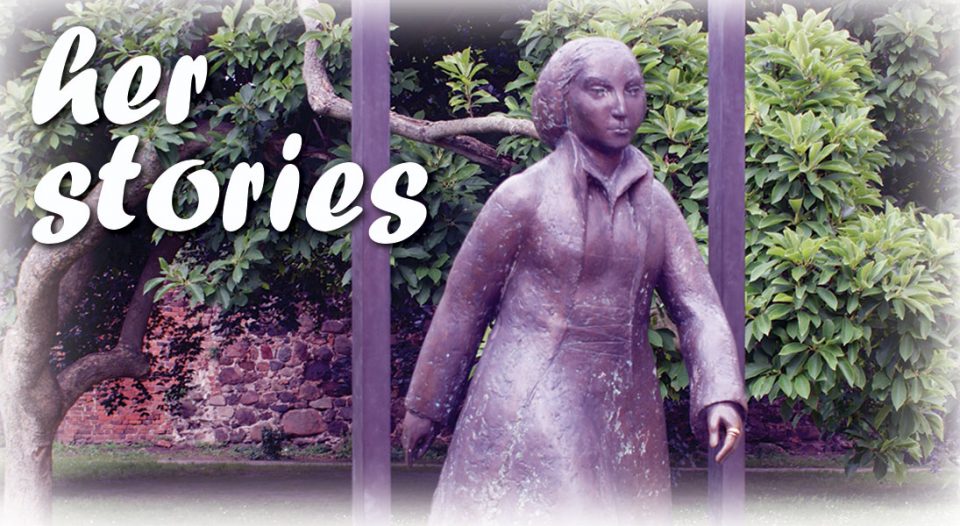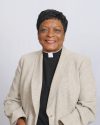Editor’s note: This story is a part of The Lutheran World Federation’s Her-stories global Lutheran storytelling project. If you have a story of how women have reformed the church or influenced your spiritual life, email it to justiceforwomen@elca.org with “Her-stories” in the subject line. Written stories can be up to 1,300 words. Audio/video can be up to five minutes. To learn more about Her-stories and submission guidelines, please click here.
The title for my paper is taken from an event recorded in John 4:4-42: “He had to go through Samaria.” There Jesus meets a woman at Jacob’s well and quenches her thirst with the Living Water of spiritual life. At the well, Jesus meets the woman where she lives as she is. The woman came to the well with an empty pitcher that needed to be filled. She receives the precious gift of Living Water and carries it to others leaving her pitcher behind.
What has been my experience as a woman in the church?
I first heard the story as a child at my grandmother’s knee. Later in life I would come as the woman to rest at the worship well and partake of the Living Water. I came to the foreign well of Lutheran worship on the native soil of my African American community. I was wearied of a life that had everything and yet was empty. There I met Jesus and that encounter transformed my life. My love for God has always remained strong. My feelings for the church stayed strong until my early 20s in the late ’60s. My feelings of love for the organized church were replaced by feelings of hurt, disappointment, abandonment and remorse. The church now seemed like an archaic institution, completely unable and unwilling to address the issues and concerns confronting this present age, the African American community, and women in general. Thus, to me, the church seemed disinclined and averse to helping this young single mother reconcile my broken ties with the church on terms that would have left me feeling truly forgiven and accepted verses like a second-class member.
So, I left the church, but not God. During those years of drifting spiritually, I believed that I could make it on my own without nurturing my relationship with God through the church. Despite having all the material and familial things in place, I knew something was missing. I was not quite sure what that something was or how I was to obtain it. What I did know for sure was that the joy and the peace of mind that my grandmother and all the God-conscious women and men I knew always seemed to possess during good times and bad was not in my possession – the peace of mind that helped them survive the Atlantic passage, centuries of enslavement, dehumanization of being raped, watching loved ones being sold away and lynched, enduring years of the Jim Crow era, de-facto segregation, mass incarceration and slaughter of the innocent. Whatever that something was, that power that got them through and gave them songs to sing like, “My soul looks back and wonders how I got over,” I wanted it and needed it.
As God’s peace quieted my soul, I could hear the voice of God gently calling me back to God. I realized the loneliness and confusion I was experiencing were a direct result of my distance and separation from God. A biblical verse that often came to mind during this period and one that I often reflect on today is “Be still and know that I am God!” (Psalm 46:10).
My re-entry into the institutional church came through my daughters. Remembering my own childhood experience, I felt they were being deprived of one of the great joys of life, knowing and having Jesus as your best friend. Still reluctant to make a formal commitment to the church, I enrolled my daughters in a Lutheran school. Having no formal knowledge of the theology of the Lutheran faith, I decided to explore what my children would be learning in their religion classes. The assistant pastor helped me understand the Lutheran faith. He helped me understand the loving and forgiving nature of God.
As we went through the Scripture, sitting there at Jacob’s well inside a Lutheran church, I began to hear the message as I had never heard it before. It was as if I had been deaf. Now, I could not only hear the words but also gained the ability to translate the words into a significant message for me. Forgiveness, God’s forgiveness, which I had needed for so long but felt totally unworthy of receiving, was now mine. I know God’s grace is a message proclaimed at every Christian service, but it was the first time that I really understood its meaning. On hearing, receiving and accepting the words of forgiveness, I felt redeemed, relieved, transformed, alive and no longer estranged from my Creator. On Oct. 31, 1975, I knelt to receive the sacrament of Holy Baptism.
Fourteen years later with a sincere belief that God was indeed calling me to another level of service, I enrolled in seminary. After the first year, I found the seminary to be myopic and reluctant to embrace concepts or systematic viewpoints other than those fashioned from the European theological framework of the 15th century. At times, it seemed like the institution was determined to reject this African American female foreign body out of its system.
At the end of the second year of my seminary studies, the process of discerning my call began anew. The apprehension concerned whether African American theology and hermeneutical methodology with a womanist bent could blend into the European-centered frame of practice without losing its effectiveness and power. If so, then how?
It was non-Lutherans who helped undergird my faith and instilled within me an appreciation for the theology that comes out of the Lutheran tradition. As I began to search for the answers to these questions, my instincts let me know that the answers lay outside the Lutheran seminary context. In what I consider to be an act of divine providence, the ELCA entered a contractual agreement with Emory University and The Interdenominational Center in Atlanta to begin an extended studies program for those with an interest in urban ministry. I was among the first group of students to enroll in the program at Emory University. Through the nurturing and instruction of the center’s administrative staff, professors and academic instructors, I gained a greater appreciation of the Lutheran ethos and theology. They helped me understand the paradoxical nature of the Lutheran church and African American community along with the historical ethnic diversity of the Lutheran church. I saw God’s historical working in the church and continuing to bring the church to perfection. It became more apparent how God’s plan included me. The Lutheran church represents the well where I came to accept fully God’s loving grace. As God used this church to reach me, I believe God wants to use me as an instrument to offer the Living Water to others who come and lean against this Lutheran well.
What role have women played in my journey home?
It has been through the living examples and testimonies of women of faith that I received the greatest support and guidance for successfully navigating this journey – through involvement in the women’s ministry groups, Bible studies, retreats and conferences. Women I still listen to and turn to for advice, mentoring and friendship. And most importantly, I try to emulate. Their greatest words of wisdom I pass on to those who are listening; “Wherever you find yourself, for support and advocacy, always be part of a sisterhood circle. And if there isn’t one, initiate one.” Having been the first African American woman ordained on the West Coast, I have influenced many young women who had not seen nor heard an African American Lutheran female minister to pursue this ministry and seek greater service in the community. It is hard imagining yourself becoming what you have never seen. I have helped my church in this area by broadening our understanding and reception of the other. Per the witness of Scripture: “Whom so ever will come to the well may they continue to come and drink” (Revelation 22:17 paraphrase). And to that I say, Amen!





